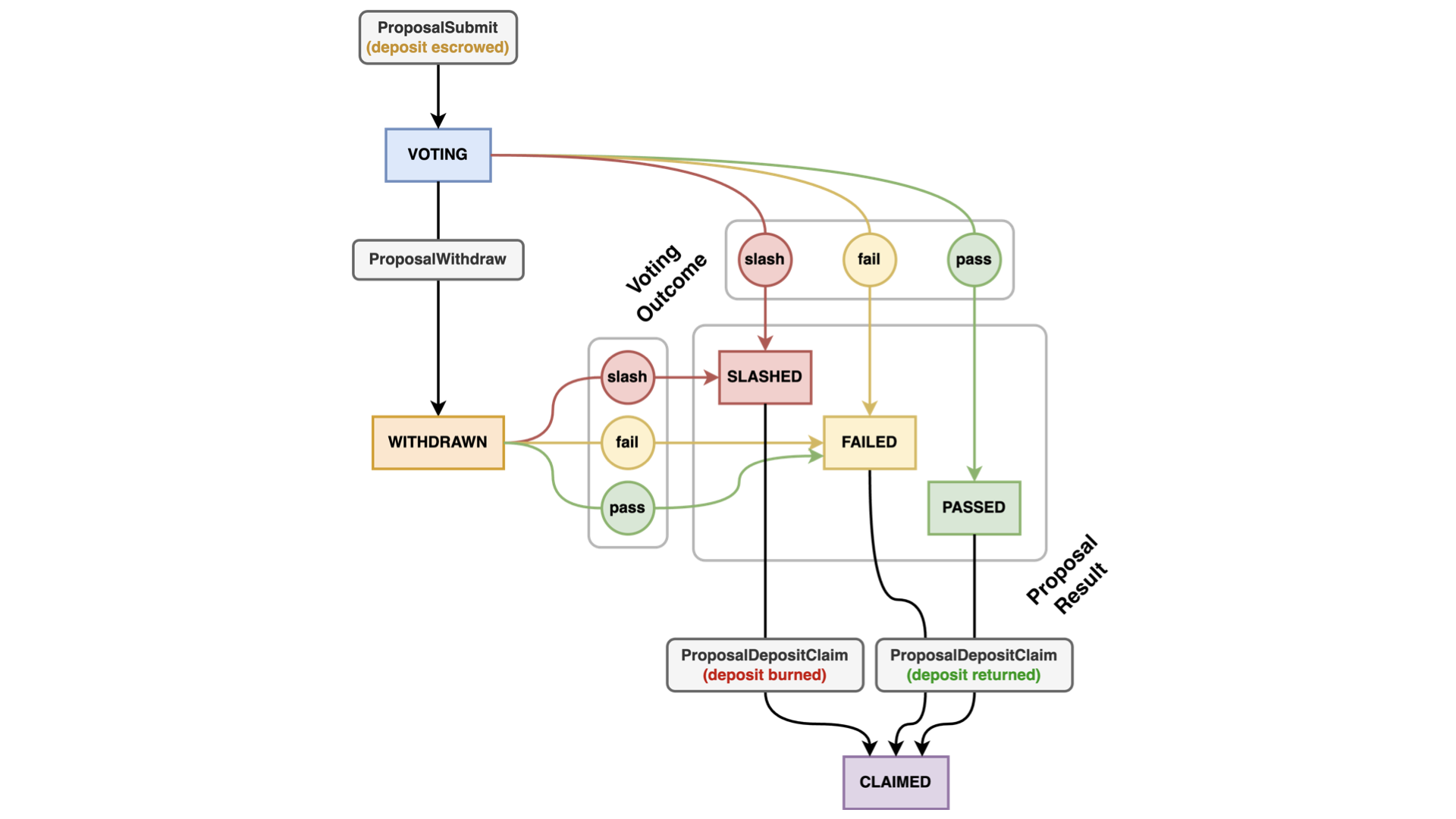Decentralized Governance
Penumbra has a decentralized governance system intended to help the community of Penumbra users and stakeholders coordinate and express their opinions about the future of the protocol. As a decentralized protocol, no single entity is in control of the network. Penumbra's governance system does not have control over the network either, and acts as a coordination and signaling mechanism for the community.
Penumbra's governance system is modeled after the design of the Cosmos SDK: validators cast default votes on behalf of their delegators, which delegators can permissionlessly override.
Proposals
Anyone can submit a governance proposal by depositing the required deposit of tokens. This permissionless model enables all stakeholders to participate in the governance process.
Deposit
A proposal submitter must submit an escrow deposit. This deposit may be claimed after the voting concludes whether or not the proposal passes, or if the proposal is withdrawn.
The deposit cannot be returned if the number of no votes exceeds the network's current proposal slash threshold parameter. The current required proposal deposit is 10 UM (set by the proposalDepositAmount parameter)
Proposal Types
There are several types of proposal:
- Signaling: the primary type of proposal, which has no effect on the chain. Signaling proposals allow collecting community sentiment as part of the process for reaching consensus.
- Upgrade: a special kind of signaling proposal that also coordinates a chain halt. Once the chain halts, full node operators can choose whether to apply an upgrade to a new software version.
- Emergency: a special kind of signaling proposal that also optionally coordinates a chain halt. Emergency proposals have special acceptance criteria but limited powers, described below.
- Parameter Change: adjusts technical parameters for the chain's operation.
- (Un)Freeze IBC Client: allows (un)freezing an IBC client for a counterparty chain, e.g., in the event the community determines that a counterparty chain was compromised.
- Community Pool Spend: spends funds from the community pool. Currently disabled via chain parameter pending community consensus around the role of the community pool and to minimize protocol risk.
Voting
Both delegators and validators can vote on proposals. Validator votes are public, attributable, and act as default votes for their delegators. Delegator votes are anonymous, and override their portion of the validator's vote. Delegators can vote only if they held delegation tokens to active validators when the proposal was submitted.
Vote Types
There are three types of vote:
YesNoAbstain
Penumbra does not have a NoWithVeto vote type. Proposal deposits will be slashed if the number of no votes exceeds the network's current proposal slash threshold parameter (80% by default, set by the proposalSlashThreshold parameter). The slashing mechanism exists to deter spam proposals.
Votes cannot be changed after they are cast.
Pass Criteria
At the end of the voting period, a proposal passes, fails, or is slashed. The proposal can also be withdrawn before the voting period ends. A withdrawn proposal can still be slashed. This diagram illustrates the proposal lifecycle:

Non-emergency proposals pass as long as they achieve:
- Duration: voting ends after a specified period, allowing delegators to vote (initially 48h, set by the
proposalVotingBlocksparameter); - Quorum: the minimum percentage of staked tokens that must have voted (40% on mainnet, set by the
proposalValidQuorumparameter); - Threshold: the percentage of YES votes out of all votes must be above this threshold (67% on mainnet, set by the
proposalPassThresholdparameter).
Emergency proposals have special criteria: they pass immediately as soon as 1/3+1 of the stake weight votes YES, without waiting for delegator votes. However, emergency proposals cannot actually do anything. This replicates the ability of a 1/3+1 stake-weight minority to halt the chain.
Voting Receipts
Delegators who vote on governance proposals receive voting receipt tokens, in proportion to their voting power. The voting receipt tokens are the same regardless of how the delegator voted, and are an on-chain equivalent of an "I Voted" sticker. They serve no other function in the protocol than to indicate to a user that they have already voted.